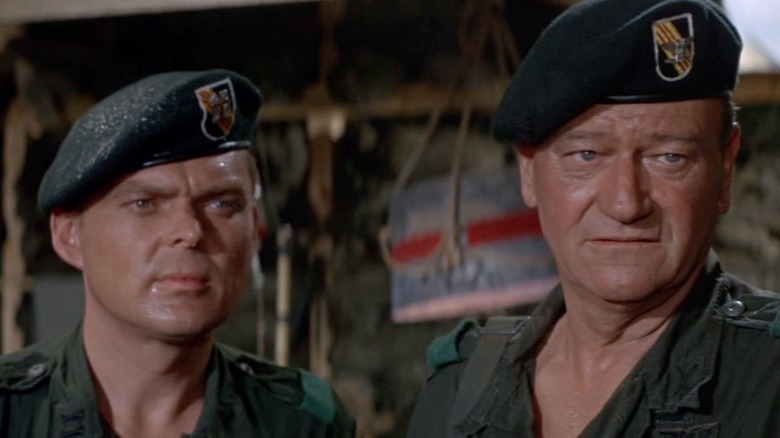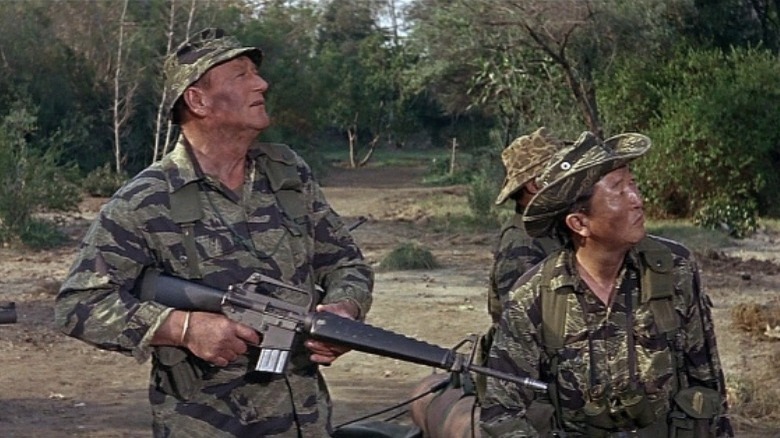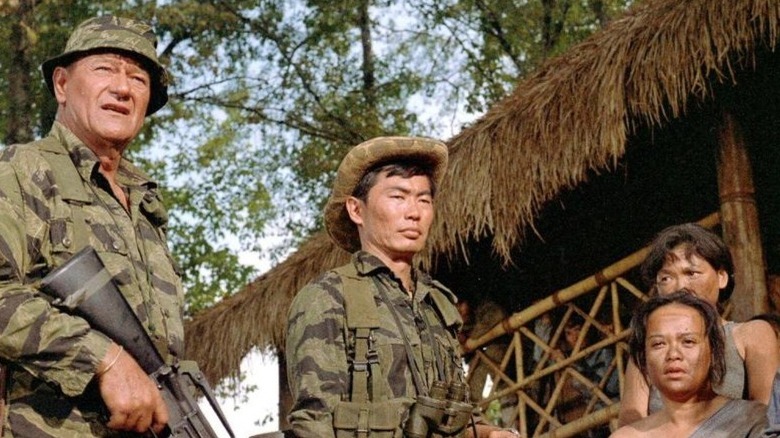How The Government Shaped John Wayne's Most Controversial Film
John Wayne made a lot of movies over his long career, appearing in 181 credited roles over his lifetime. The Western star is only officially credited with directing two films, though. One is 1960's "The Alley." The other is 1968's "The Green Berets," the rare Vietnam War film that was actually made while the war was still happening. "The Green Berets" was supposed to be based on Robin Moore's 1965 novel of the same name, but Wayne decided to get the U.S. government involved in the production, and the final result was something else entirely – a pro-military propaganda piece.
From the beginning, Wayne wanted to portray Americans in Vietnam in a positive light. History Net quotes the actor-director as saying that a film about the war would get made one way or another soon enough, so "let's make sure it is the kind of picture that will help our cause throughout the world." His cause was explicitly an ideological one.
The Military Had The Last Word On The Green Berets
According to reporting by The Guardian's Alex von Tunzelmann, Wayne requested official government approval for the film by writing to President Lyndon B. Johnson, and as a result, the military ended up having total control over their image in the film. The Pentagon let Wayne film on military bases, but also expected complete script approval.
Moore's book apparently frustrated officials who thought it revealed classified information. Though James Lee Barrett is the film's credited screenwriter, History Net reports the director and his son Michael Wayne did extensive rewrites over 18 months to create a script the U.S. Defense Department approved of. The film's shoot took place largely at Fort Benning, Georgia, where the crew was permitted to use military equipment.
The result, as expected, is a film that bears little resemblance to actual history. Vietnamese characters, including a captain played by George Takai, speak in fractured English. The American characters all appear as cuddly heroes, while, as von Tunzelmann puts it, "the Vietcong are a massive, faceless force of evil, murdering children and raping women."
Ebert Called It Out As Propaganda
Despite Wayne's attempts to create a piece of ra-ra military fiction to inspire support of the war, people saw right through "The Green Berets" upon its release. Roger Ebert succinctly wrote about the ways the film offensively oversimplified the war:
"The Green Berets" simply will not do as a film about the war in Vietnam. It is offensive not only to those who oppose American policy but even to those who support it. At this moment in our history, locked in the longest and one of the most controversial wars we have ever fought, what we certainly do not need is a movie depicting Vietnam in terms of cowboys and Indians. That is cruel and dishonest and unworthy of the thousands who have died there.
Ebert went on to describe the film as heavy-handed and embarrassing, labeling it propaganda along the way. While the military involvement in "The Green Berets" sounds like an oddity of the past, the U.S. The Department of Defense actually still works on films to this day, explaining on their own government website that they "want to tell the military story right." The CIA and NASA have also reportedly been involved in crafting their image on screen, from the CIA's controversial involvement with "Zero Dark Thirty" to NASA's presence in films ranging from "Apollo 13" to "F9." Wayne's film is a great reminder that if you see a real-life person or organization being portrayed on screen, it's always worth looking further into who's crafting that image.


